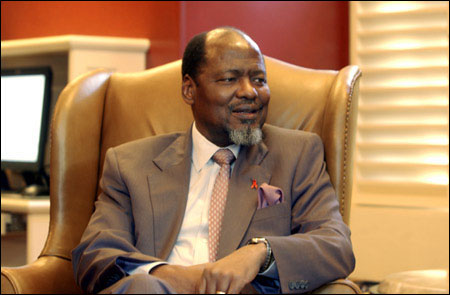Joaquim Chissano expresses hope for future of Africa
Mozambique president says ‘Africa is winning the battle against violent conflicts’

Declaring that “Africa is winning the battle against violent conflicts,” Mozambican President Joaquim Chissano brought his vision of hope, prosperity, and peace to a packed forum at the Kennedy School on Sunday (Sept. 19).
Kennedy School Dean David Ellwood introduced Chissano as a “revolutionary, statesman, democrat, fighter.” Chissano, delivering the 2004 Albert Gordon Lecture, outlined the root causes of conflict in Africa and the steps being taken to prevent, manage, and resolve them. He said African leaders are engaged in collective actions to promote economic and social development across the continent.
“Our search for peaceful solutions has been a priority” over the past five years, Chissano stated, and that search is paying off. In 1999, he noted, 19 violent conflagrations were raging in Africa; today, that number has been reduced to five, due in part to the organized efforts of African leaders working in partnership with the international community.
The ethnic and tribal divisions endemic to so many conflicts in Africa thrive in
‘No longer can an African state hide behind its sovereignty in order to oppress its own peoples.’
– Joaquim Chissano,
President of Mozambique
societies with extreme poverty and inequality, observed Chissano. Sustained economic growth, he maintained, is the key to reducing violence. Essential, too, are partnerships among African nations. Chissano noted that the African Union (AU), which he helped to launch in 2002, is empowered in part to intervene in countries where atrocities are being committed.
“No longer can an African state hide behind its sovereignty in order to oppress its own people,” he declared. He noted that, despite its meager resources, the AU has sent military personnel and others to Darfur to assess the situation “on the ground” and, by their presence, “serve as a deterrent” to the continuing violence.
Chissano knows firsthand about making peace. In 1992, six years after becoming Mozambique’s head of state, he brokered an accord that ended a horrific civil war in his country that had dragged on for 16 years. Today, Mozambique’s 18 million people, while still facing many hardships, live in peace – an accomplishment that Chissano said is a source of great pride for him.
The 65-year-old Chissano is voluntarily stepping down from power after serving two terms as the first democratically elected president. He began his remarkable 40-year political career in the early 1960s as a Mozambique freedom fighter when the country was a Portuguese colony. Mozambique, located on Africa’s southeastern coast, won its independence in 1975 and Chissano served as foreign minister in the first socialist government. Chissano became head of state when then-President Samora Machel was killed in a plane crash in 1986. Chissano instituted free elections and in 1994 was elected president. He worked to attract foreign investment and turned Mozambique into one of the fastest growing economies in the world. He also alleviated the country’s crushing foreign debt burden by negotiating debt forgiveness of its foreign loans.
In his talk, Chissano implored Harvard and the Kennedy School to become partners in AU initiatives like New Partnership for Africa’s Development to explore models in international development and to exchange knowledge. “The beauty of knowledge is that you can give it away without losing it,” he said. “In fact, the more you give away, the more you gain.”




